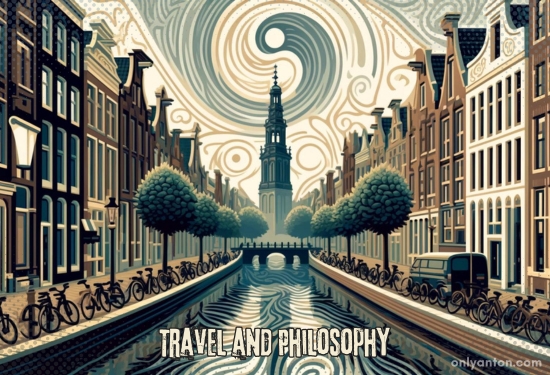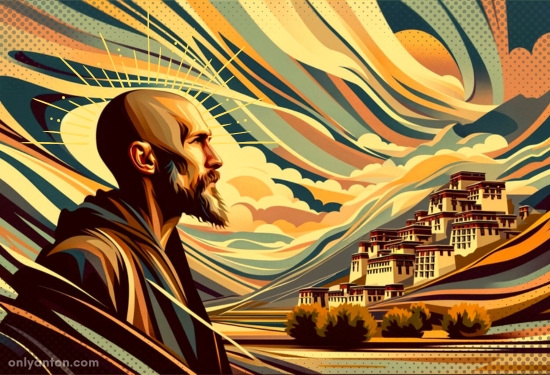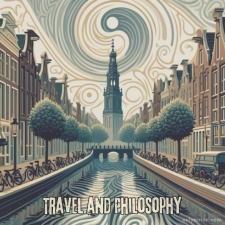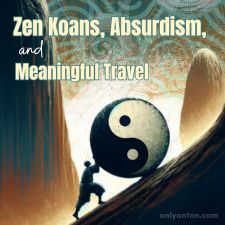What Philosophy Can Teach Us About Travel

Introduction
How can philosophy inform how we travel? What are the connections between travel and philosophy?
Philosophical concepts act as lenses, shaping and focusing our perceptions of the world. Much like a mirror that reflects our image, philosophy reflects back our thoughts, beliefs, and values. Philosophy, much like travel itself, offers new perspectives on the world around us. As a result, travel and philosophy share a certain affinity.
Travel, in particular, is capable of reflecting our deepest desires, fears, and aspirations. Just as we gaze into a mirror to see our physical selves, travel reflects our inner landscapes. Travel invites us to plumb the depths of our souls. As we navigate the world, we discover new places and hidden facets of our own being, shaping our understanding and perception of the world.
One way philosophy enhances travel is by encouraging mindfulness, the practice of being present and fully engaged in the moment. Applying philosophical ideas to our travels enables us to be more aware of our surroundings. We become more appreciative of the beauty around us. We become more mindful of our impact on the places we visit.
Additionally, philosophy can deepen our understanding of different cultures and ways of life. By studying the philosophies of other cultures, we can gain insight into their values, beliefs, and worldviews. Philosophy helps us to connect more deeply with the people we meet and the places we visit. Simultaneously, we gain insight into our own biases and privileges. We arrive at a greater understanding of our own position within the wider world.
Furthermore, philosophy can help us navigate the challenges and uncertainties of travel. Philosophical concepts such as resilience, adaptability, and acceptance teach us to embrace the unexpected. They allow us to find meaning in even the most difficult experiences.
Overall, the application of philosophical concepts to travel can enrich our experiences. Philosophy deepens our connections with the world around us and helps us to live more fully in the present moment.
Philosophy’s Impact on Travel
Travel and the Meaning of Life
Have you ever found yourself pondering life’s big questions, even in the most ordinary moments? Maybe you’ve debated what it means to live a ‘good life’. Perhaps you have questioned why specific experiences feel more meaningful than others.
These moments of reflection are more than passing thoughts—they’re glimpses into the world of philosophy. Philosophy isn’t just for scholars in ivory towers. It’s a natural part of our everyday lives, shaping how we view the world and make decisions.
Think about it: when you decide what activities to prioritize during your travels, you’re engaging in philosophical reflection. Whether you’re seeking adventure or tranquility, you’re considering what brings value and meaning to your experiences. Choosing where to go and what to see is a philosophical decision rooted in your beliefs and values.
By recognizing these everyday moments of philosophical thinking, we can see the profound impact philosophy has on our lives, especially when it comes to travel. In the forthcoming series, we’ll explore how philosophical ideas can enrich our travel experiences, offering new perspectives and deeper insights into the world.
How Philosophy Applies to Travel
Philosophy, derived from the Greek word philosophia, translates to the ‘love of wisdom.’ But what is wisdom, and why should we seek it, especially in our travels? Wisdom isn’t just about knowing facts or information. It’s about understanding the deeper truths of life and applying them to our actions and decisions.
When we travel, we’re not just moving from place to place. We’re seeking experiences that enrich our lives and broaden our perspectives. Philosophy, at its core, is a quest for understanding these fundamental aspects of existence. While it may seem abstract, its principles profoundly impact our daily lives. This includes how we perceive and engage with the world around us, particularly when we travel.
At its core, philosophy encourages us to question the nature of our experiences and the world. This critical thinking can be precious in travel. Encounters with new cultures, landscapes, and ideas may challenge our existing beliefs and perspectives. However, travellers can approach these experiences with curiosity and open-mindedness. Adopting a philosophical mindset can enrich their journeys with deeper insights and appreciation.
Travel and the Benefits of Philosophy
One of the critical benefits of philosophy in travel is its ability to provide a framework for understanding and interpreting our experiences. Concepts from ethics, aesthetics, and metaphysics offer lenses through which we can view the world. New perspectives allow us to engage with new cultures and environments more meaningfully. For example, aesthetic considerations can help us appreciate the profound beauty of nature. Ethical considerations can guide our interactions with local communities.
Moreover, philosophy encourages mindfulness and reflection, encouraging travellers to engage more deeply with their surroundings. By contemplating philosophical questions during our travels, such as the nature of existence or the concept of time, we can cultivate a greater sense of presence and awareness, leading to more profound and fulfilling experiences.
In essence, philosophy can guide our travels, helping us navigate new experiences with wisdom, curiosity, and a deeper appreciation for the world’s diversity. As we embark on our journeys, let us embrace the lessons that philosophy offers, allowing them to enrich our experiences and broaden our horizons.

Making Intentional and Meaningful Travel Choices
When we travel, we’re faced with myriad decisions: where to go, what to see, and what to eat. Each choice shapes our journey in unique ways. It’s easy to get caught up in the excitement of exploring new places. Too often, we overlook the more profound significance of these decisions. However, by applying philosophical principles to our travel choices, we can make more intentional and meaningful decisions that enrich our experiences.
Travel and Mindfulness
One such principle is mindfulness, the practice of being fully present and aware of our thoughts, feelings, and surroundings. Mindfulness can enhance our travel experiences by helping us appreciate the present moment. Moreover, it can help us cultivate a deeper connection with the places we visit.
Mindfulness is the practice of being fully present and engaged in the moment, which allows us to appreciate our experiences with greater depth and clarity.
When we practice mindfulness during our travels, we’re more likely to notice the small details that make each destination unique. Listen to the sound of waves crashing on the shore. Breathe in the aroma of street food wafting through the air. Stop and appreciate the intricate architecture of a historic building. By being mindful, we can savour these moments and create lasting memories that transcend the ordinary.
Travel and Ethics
Ethics refers to the principles or moral values that guide our behaviour and decision-making. In travel, ethics can help us consider the impact of our actions on the places we visit and the people we encounter. We can ensure that our experiences are enriching for us and respectful and beneficial for the communities we engage with.
Ethics guides our behaviour by helping us understand what is right or wrong, shaping our decisions and actions to align with moral principles.
For instance, ethical travellers may support local businesses instead of large corporations. They may opt for eco-friendly accommodations. They may engage in responsible tourism practices that minimize their environmental impact. By making ethical choices, travellers can contribute positively to the places they visit and create meaningful connections with local communities.
Travel and Aesthetics
Aesthetics, the branch of philosophy that deals with the nature of beauty and art, can also inform our travel decisions. By appreciating the aesthetic value of our surroundings, we can enhance our travel experiences and gain a deeper understanding of the cultures we encounter.
Aesthetics explores the nature of beauty and art, inviting us to appreciate the sensory experiences that enrich our lives and shape our perceptions.
When we visit a museum or art gallery, for instance, we’re not just admiring the artwork. We’re engaging with a particular society’s cultural heritage and artistic expression. In a broader sense, aesthetic considerations call us to exercise, to be mindful of, and to appreciate our sensory perceptions—the sights, sounds, smells, tastes, and textures that surround us—not only when we travel but also in our quotidian existence. An appreciation of the aesthetic aspects of our destinations can broaden our perspectives and develop a greater appreciation for the diversity of human creativity.
Fundamentally, philosophy can serve as a guidebook for making intentional and meaningful travel choices. Philosophy can help us engage more deeply with our experiences and the world around us. By incorporating mindfulness, ethics, and aesthetics into our travels, we can create transformative experiences that enrich our lives and broaden our horizons.
Embarking on a Philosophical Journey
As we’ve explored the profound ways philosophy can enrich our travel experiences, I invite you to join me on a philosophical journey through travel. In upcoming series, I’ll delve into the teachings of various philosophers and philosophies. I will reveal their insights and how they’ve shaped my approach to travel.
Upcoming Series
The first series, “What Buddhism Taught Me About Travel,” will take you on a reflective journey inspired by the wisdom of the Buddha. Through four initial posts, we’ll look at concepts such as impermanence, mindfulness, and the nature of suffering. We will also uncover how these teachings can transform how we travel and experience the world.
Following this, we’ll delve into other philosophical traditions. One such tradition is the Absurdist philosophy and teachings of thinkers like Albert Camus. We will question how embracing life’s inherent absurdity can lead to a deeper appreciation of the present moment and a more authentic travel experience.
We’ll also explore the wisdom of Lao Tzu and Taoism. We will examine how the principles of balance and harmony can guide us in our travels and help us find peace and connection amid life’s complexities.
Additionally, we’ll delve into the teachings of Epicurus. We will explore the philosophy of pleasure and the pursuit of a simple and tranquil life. Through this series, we’ll discover how cultivating a sense of contentment and gratitude can enhance our travel experiences and lead to a more fulfilling life.
Finally, we’ll explore existentialism and the insights of philosophers like Jean-Paul Sartre and Simone de Beauvoir. We will reflect on the freedom and responsibility inherent in our choices. In addition, we will examine how embracing our existential freedom can lead to a more authentic and meaningful travel experience.
I invite you to join me on this journey of exploration and discovery. We will delve into the fertile terrain of philosophical thought and its profound relevance to our lives and travels. Together, we will uncover new perspectives, deepen our understanding of the world, and plunge into a transformative journey of self-discovery and growth.
Conclusion: Embracing Travel and Philosophy
In this exploration of the intersection of travel and philosophy, we’ve discovered how philosophical principles can enrich our travel experiences and deepen our understanding of the world. We’ve learned that philosophy is not just a subject for scholars. It’s a natural part of our everyday lives, shaping how we perceive and engage with the world around us.
By adopting a philosophical mindset, we can approach our travels with greater intentionality and mindfulness. We can make choices that enrich our experiences and contribute positively to the places we visit and the people we encounter. Concepts like ethics, aesthetics, and mindfulness can guide us in our travels. They can help us create transformative experiences that broaden our horizons and deepen our appreciation for the world’s diversity.
As we depart on this philosophical journey through travel, I invite you to join me in exploring the teachings of various philosophers and philosophies. Share your experiences or thoughts on how philosophy has influenced your travels, and join the conversation. Your insights and perspectives are valuable additions to our exploration of the world through philosophical lenses.
I also invite you to subscribe to my newsletter for updates on new posts and series. Stay informed about upcoming articles, delve deeper into the world of philosophy, and travel with me. Together, we can explore the rich tapestry of philosophical thought and its profound relevance to our lives and travels.
Join me on this philosophical journey through travel, and let’s explore the world together, one thoughtful step at a time.
Further Reading:
External resources
For those interested in exploring the philosophical aspects of travel further, here are some resources that might deepen your understanding:
- “The Art of Travel” by Alain de Botton: This book delves into the philosophical dimensions of travel, examining why we travel and how it can enrich our lives. Available at your local library or for purchase here.
- “The Meaning of Travel” by Emily Thomas: An exploration of the places where philosophy and travel intersect and profound questions are confronted. Check it out at your local library or find it online here.
- Wikipedia, “Cultural Tourism”: An overview of how travel can be a means of exploring and understanding different cultures. Learn more here.
Related Posts
For additional insights and reflections on travel, consider reading some of my Philosophical Travel Series or other blog posts on related topics:
- What Buddhism Taught Me About Travel
- Travel and Absurdist Philosophy: Lessons from Albert Camus
- Mindful Travel: Finding Meaning in Our Journeys




